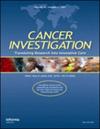老年癌症患者化疗初始剂量的减少:回顾性队列
IF 1.9
4区 医学
Q3 ONCOLOGY
引用次数: 0
摘要
在化疗第一疗程中减少初始剂量(PDR)是一种经验性做法,常用于老年人群。研究人员招募了 70 岁以上接受第一疗程化疗的实体瘤患者。共纳入 179 名患者。69.8%的患者使用了标准剂量,30.2%接受了PDR化疗。只有 29.6% 的患者接受了标准化老年病学评估。接受标准剂量化疗的患者出现 83.2% 的毒性反应,而接受 PDR 化疗的患者出现 68% 的毒性反应。减少第一周期化疗剂量的患者的毒性发生率明显降低。本文章由计算机程序翻译,如有差异,请以英文原文为准。
Chemotherapy Primary Dose Reduction in Older Cancer Patients: A Retrospective Cohort.
Primary dose reduction (PDR) in the first course of chemotherapy is an empirical practice, commonly used in older population. Patients over 70 years old receiving a first course of chemotherapy for a solid tumor were enrolled. A total of 179 patients were included. Standard dose was used in 69.8% of patients, while 30.2% received PDR of chemotherapy. Only 29.6% received a standardized geriatric assessment. Patients receiving standard doses presented 83.2% of toxicities, while 68% of toxicities were reported in patients receiving PDR. The toxicity rate was significantly decreased in patients treated with reduced first-cycle dose of chemotherapy.
求助全文
通过发布文献求助,成功后即可免费获取论文全文。
去求助
来源期刊

Cancer Investigation
医学-肿瘤学
CiteScore
3.80
自引率
4.20%
发文量
71
审稿时长
8.5 months
期刊介绍:
Cancer Investigation is one of the most highly regarded and recognized journals in the field of basic and clinical oncology. It is designed to give physicians a comprehensive resource on the current state of progress in the cancer field as well as a broad background of reliable information necessary for effective decision making. In addition to presenting original papers of fundamental significance, it also publishes reviews, essays, specialized presentations of controversies, considerations of new technologies and their applications to specific laboratory problems, discussions of public issues, miniseries on major topics, new and experimental drugs and therapies, and an innovative letters to the editor section. One of the unique features of the journal is its departmentalized editorial sections reporting on more than 30 subject categories covering the broad spectrum of specialized areas that together comprise the field of oncology. Edited by leading physicians and research scientists, these sections make Cancer Investigation the prime resource for clinicians seeking to make sense of the sometimes-overwhelming amount of information available throughout the field. In addition to its peer-reviewed clinical research, the journal also features translational studies that bridge the gap between the laboratory and the clinic.
 求助内容:
求助内容: 应助结果提醒方式:
应助结果提醒方式:


